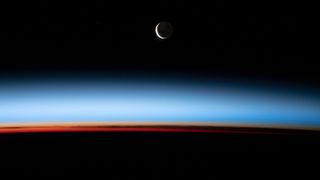Astronaut snaps spectacular shot of crescent moon glowing over stunning sunset
The incredible image was taken by hand using a digital camera onboard the International Space Station.

An astronaut aboard the International Space Station (ISS) has captured a stunning photo of a crescent moon above Earth as the last light of the setting sun shines through the different layers of the atmosphere.
The photo was taken Dec. 6, 2021, by an unnamed member of the Expedition 66 crew — a group of seven astronauts from NASA, the European Space Agency, the Japan Aerospace Exploration Agency and Russia's State Space Corporation, Roscosmos. The image was taken using a digital camera as the ISS passed over the Pacific Ocean east of New Zealand at an altitude of around 262 miles (422 kilometers).
NASA's Earth Observatory released the photo on Dec. 31, 2021. "This view offers a symbolic end to the year 2021 and a look toward NASA's next goal for human-crewed exploration," Earth Observatory representatives said in a statement.
Related: 12 amazing Landsat satellite images of Earth from space
The photo features a multicolored orbital sunset that fades from orange near Earth's surface to dark blue at the boundary of space. The different colors belong to the first four layers of the atmosphere: the troposphere, between zero and 7.5 miles (12 km); the stratosphere, between 7.5 and 31 miles (50 km); the mesosphere, between 31 and 50 miles (80 km); and the thermosphere, between 50 and 440 miles (700 km), according to NASA.
The different colors are the result of a phenomenon known as Rayleigh scattering, named after the 19th-century British physicist Lord Rayleigh. In this process, electromagnetic radiation, such as visible light, is scattered by particles smaller than its wavelength, such as air molecules. (What we see is the light of those scattered wavelengths.) Each layer of the atmosphere has a different density of gas particles, meaning the scattered light is a different color in each of those layers.
Originally published on Live Science.
Get the Space.com Newsletter
Breaking space news, the latest updates on rocket launches, skywatching events and more!
Join our Space Forums to keep talking space on the latest missions, night sky and more! And if you have a news tip, correction or comment, let us know at: community@space.com.

Harry is a U.K.-based staff writer at Live Science. He studied Marine Biology at the University of Exeter (Penryn campus) and after graduating started his own blog site "Marine Madness," which he continues to run with other ocean enthusiasts. He is also interested in evolution, climate change, robots, space exploration, environmental conservation and anything that's been fossilized. When not at work he can be found watching sci-fi films, playing old Pokemon games or running (probably slower than he'd like).

